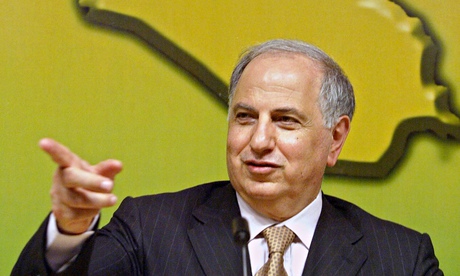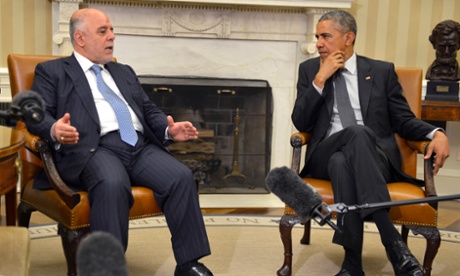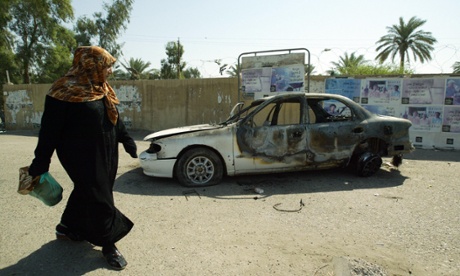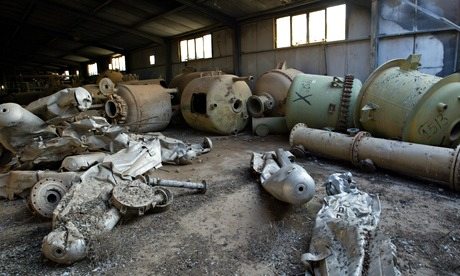Ahmed Chalabi, who did more than any other Iraqi to encourage the 2003 US invasion of Baghdad, has died aged 71. An exile for most of his life, he remained a political exile inside his country for much of the last decade, his public profile and reputation having waned but his capacity to influence affairs in Iraq and beyond less diminished.
Hailed as a transformative figure before and after the ousting of Saddam Hussein, Chalabi was sidelined by the US government within 15 months of landing with the invading American military in the early moments of the war.
He had fought a 20-year campaign to convince the US to move against the Iraqi dictator. As the war approached, Chalabi provided a stream of informants to US officials and journalists in an attempt to convince them that Saddam possessed weapons of mass destruction – the central plank of the US case for war. He was instrumental in the passage of the Iraq Liberation Act, which channelled close to $100m to opposition groups in the late 1990s, principally his political body, the Iraqi National Congress (INC).
None of the information provided was corroborated, an omission for which Chalabi remained unapologetic while at the same time insisting that he’d been pushing an open door. “We did what we had to do,” he told the Guardian in 2010. “Saddam is gone and Iraq is a better place. They wanted to go to war anyway.”
Chalabi was championed by senior officials in the Bush administration, mainly from the Pentagon, as a man with secular values who could help democratise Iraq. In early 2004 he was Laura Bush’s guest at her husband’s State of the Union speech. By then the INC was receiving $350,000 per month from the Defence Intelligence Agency and enjoyed the patronage in Baghdad of the US-run transitional administration, which still had big ideas for him.
That was to change within weeks. In May US soldiers raided his compound in Baghdad over allegations that he had committed fraud. That same month George Bush ordered funding for the INC be stopped, and several weeks later US officials accused Chalabi of leaking state secrets to Iran, including the fact that US intelligence had cracked an essential Iranian communications code.
As Chalabi’s relations with Washington soured, his fortunes also dipped at home. The INC failed to win a seat in the 2005 election and from there it withered as a political force. Chalabi remained unable to muster political support for any senior position in the government. He continued to do better abroad, winning the patronage of Iran, which promptly stepped in to offer funding that the US had stopped.
Although secular, Chalabi identified strongly as a Shia Muslim and with the political aspirations of Iran to be a driving force in regional affairs. Asked by the Guardian in 2012 about his legacy, he responded heartily: “The Shia are rising!” He added: “It is natural to be close to Iran. They are from this region and they have our interests at heart.”
In the past five years Chalabi’s relationship with Iran’s leaders and the Revolutionary Guards (IRGC), the most powerful institution in Iran, came to define him almost as much as the invasion. Chalabi was one of a handful of senior Iraqis regarded as confidantes of the IRGC’s foreign relations arm, the Quds Force, and in particular its leader, Qassem Suleimani.
He actively promoted causes that were central to Iran’s interests, including making contacts with the opposition in Bahrain, which was almost exclusively Shia and at odds with the ruling Sunni establishment. In the early years of the Syrian war Chalabi was a regular visitor to Damascus, where he met often with the overlord of Bashar al-Assad’s security apparatus, Mohammed Nassif. In Beirut, where Chalabi maintained a house, he was regularly received by the Shia resistance bloc Hezbollah.
Chalabi’s influence within Shia circles was evident when he stepped in to rescue the Guardian’s then Iraq correspondent, Rory Carroll, in late 2005, several days after Carroll had been kidnapped by Shia militiamen in Sadr City. Chalabi received Carroll at his farm in west Baghdad after contacting the hostage takers directly.
In mid-2014, with the Sunni jihadi group Isis on the doorstep of Baghdad, Chalabi made one final play for political power, lobbying vigorously to replace Nouri al-Maliki as Iraq’s prime minister after Maliki’s authority had been crippled. His allies, including Suleimani, regarded him as a liability; perhaps one of the greater ironies of Chalabi’s life, the Iranian general had marked him down for being, in his words, “too liberal”.
Over the past year Chalabi resumed some contact with US embassy officials while retaining close ties to Iran. Even his foes believed his capacity, drive and intellect distinguished him from much of Iraq’s moribund political class, which largely remained silent as news of Chalabi’s death spread.
Across Baghdad, Iraqi media acknowledged him as the man who had done more than anyone to oust Saddam, but had done as little as anyone else to create an effective replacement.











